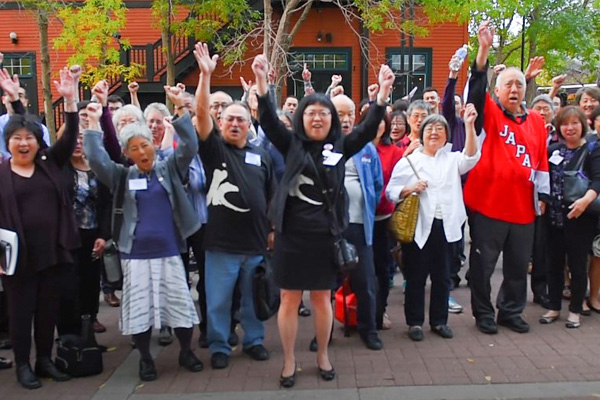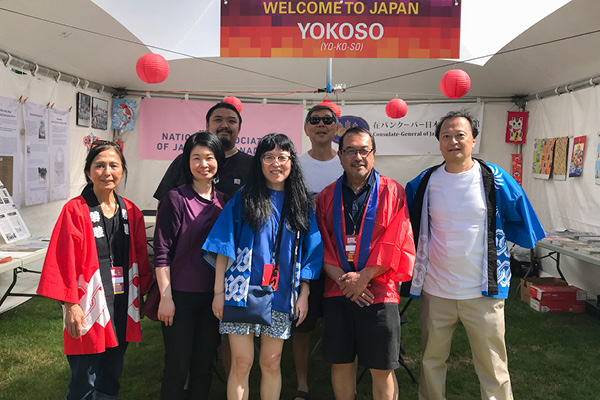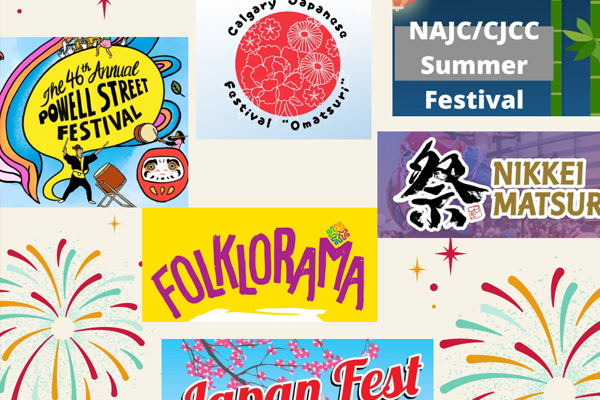by Lorene Oikawa
I had my president’s message written and then I was hit with some sad news. Tatsuo Kage is gone. I would see him at local events in Vancouver until the pandemic hit. We stopped gathering to keep everyone safe. I support the precautions. However, I miss seeing people and having the wonderful chats and hugs. I treasure those conversations.
Every once in awhile I think I’ll pick up my phone and call Jean Kamimura and then realize she is gone. If I’m speaking at a zoom event and talking about the origins of the Canadian Charter of Rights and Freedoms, I look around and imagine Gordon Kadota will be present to talk about how he led a delegation to Ottawa. When we are next at the booths at Powell Street Festival, I will miss seeing Tatsuo. He used to help with the displays for the GVJCCA booth and usually took the morning shift to help me at the start of the day.
I remember working with Tatsuo on a number of projects when I was GVJCCA president and chair of the human rights committee. He created the committee in the 1990s. He was also active in the 1980s with the Redress Movement and was appointed a co-ordinator with the NAJC Redress Implementation Program and assisted applicants. He became a director of NAJC National Executive Board and was the chair of both, the Immigration Committee and Human Rights Committee. In recognition of his contributions, he was appointed to the NAJC National Honorary Advisory Council. Tatsuo will be missed. Thank you to his family for sharing Tatsuo with us. The NEB sends heartfelt condolences to his family. If you want to share a message with the family go to https://www.korucremation.com/obituaries/tatsuo-kage/
There are so many stories we don’t know or haven’t heard and sadly it’s getting harder to hear these stories firsthand.
Eighty years ago in 1942, about 22,000 Japanese Canadians were forcibly uprooted, dispossessed, incarcerated, and exiled. The action against Japanese Canadians (babies to seniors) was a racist act not for national security. Senior representatives of both the Canadian military and the RCMP said that Japanese Canadians did not pose any threat to the security of the country. None of the Japanese Canadians was ever charged with any espionage or attacks against Canada.
Throughout this year, the National Association of Japanese Canadians will be sharing some key moments from 80 years ago. Look for the posts on our social media and on our website. For example, on February 26, 1942, the mass uprooting of Japanese Canadians begins. Some are given only 24 hours notice. Cars, cameras, and radios are confiscated for “protective measures.” A curfew is imposed.
The racism is not limited to this one year. Racism was prevalent against Indigenous peoples and racialized settlers since first contact. The incarceration that started in 1942 didn’t end until 1949, four years after the Second World War ended. The story of the injustice against Japanese Canadians in 1942 is Canadian history. We need to ensure our stories are known and shared so that the injustice is never repeated with any other group of people.
We want to hear from you. What are your memories and family stories from 1942? We want to use every opportunity to share the stories of our community. We also want to hear any stories about your family’s participation in NAJC events or activities and your reflections on the 75th anniversary of the NAJC. The Human Rights Committee has shared the story of our founding president Roger Obata in this edition of The Bulletin. We will share more stories throughout 2022. Please contact national@najc.ca with your stories or story ideas.
Also, contact the local NAJC member organization in your area to find out about their initiatives and events. They are interested in connecting with Japanese Canadians in their communities. You can find their contact information on the NAJC website https://najc.ca/member-organizations/
The applications for the Endowment Fund are being accepted until March 31 at 11:59 p.m. PST this year. The 2022 application forms are posted on the NAJC website https://najc.ca/funds-and-awards/najc-endowment-fund/ The Endowment Fund Committee is preparing for an information session for applicants later this month. Details will be posted on our website and sent through e-news.
I am very excited to let you know that the Museum of Surrey is hosting the Broken Promises exhibit which showcases the personal histories of seven Japanese Canadian families who were interned during the 1940s. The exhibit is co-curated by the Nikkei National Museum with the Royal British Columbia Museum and the Landscapes of Injustice research collective. NAJC is a partner in the Landscapes of Injustice project.
As a life-long Surrey resident, I have been working with the City of Surrey and the Museum of Surrey to provide more opportunities to share stories of Japanese Canadians who lived in Surrey especially the pioneer families. The Museum of Surrey will be including stories of Japanese Canadians in Surrey in a separate display. For those in Metro Vancouver the exhibit will be opening February 5 and run until April 24 for in-person visits. For those outside of the area there will be a virtual tour later in the month. More info: https://www.surrey.ca/arts-culture/museum-of-surrey/exhibitions/broken-promises
You can find our events, news and updates on our website and when you sign up for NAJC e-news. Please ensure we have your current email address. Subscribe: https://najc.ca/subscribe/
The National Executive Board wishes you a wonderful February and special time with your families on Family Day and Louis Riel Day in Manitoba. We will be amplifying messages for Black History Month and World Day of Social Justice on February 20th. We hope to see our members at the online Constitution Townhall on February 16th where we will be reviewing upcoming changes and voting.



